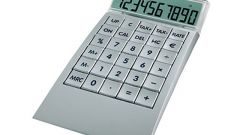Instruction
1
The amount of your salary divide by the number of working days this month. You will receive an amount of remuneration for one working day.
2
In order to learn the amount earned for one hour of work, divide the amount of your salary on the number of hours you need to work in a given month.
3
Watch for processed beyond the number of hours in a given month, you are eligible for double payment. It turns out that for all recycled watch you get double pay or extra day off, which will be paid.
4
Not finalized required in a given month the hours will be deducted from wages.
5
Now consider. Amount for one hour of work in a given month multiplied by the number of hours you worked, to the sum add the amount of the premium and the regional factor. From the resulting sum deduct the amount of tax, representing 13% of all earned money. Consider the following example:
Your salary is 100,000 rubles.
In the month of 20 working days, then 160 working hours (labour code of RF).
One day of work get 500 rubles (10000:20=500).
One hour of work get 62 rubles 50 kopecks.
You worked every day. Turns out the wages you will be paid in full, that is 10,000 rubles.
Area ratio, for example, is 15% (each area ratio). 10000+1 500=11500.
If the premium was 20%, the sum of 11500+2000=13500.
From this amount, subtract the amount of tax of 13%. It turns out 13500=1755=11745. This will be the amount of your salary for a month. When additional hours worked, you need to the amount of basic salary add double the amount of processing. For example, it looks like this:
Additionally worked 40 hours. Multiplied by the amount of pay per hour of working time and add to the amount of the basic salary. In this example, 40 hours equals 2500 (40*62,5=2500). 10000+2500+1500+2000=16000 = this earned amount. 16000=2080=13920, is the amount you will receive.
Your salary is 100,000 rubles.
In the month of 20 working days, then 160 working hours (labour code of RF).
One day of work get 500 rubles (10000:20=500).
One hour of work get 62 rubles 50 kopecks.
You worked every day. Turns out the wages you will be paid in full, that is 10,000 rubles.
Area ratio, for example, is 15% (each area ratio). 10000+1 500=11500.
If the premium was 20%, the sum of 11500+2000=13500.
From this amount, subtract the amount of tax of 13%. It turns out 13500=1755=11745. This will be the amount of your salary for a month. When additional hours worked, you need to the amount of basic salary add double the amount of processing. For example, it looks like this:
Additionally worked 40 hours. Multiplied by the amount of pay per hour of working time and add to the amount of the basic salary. In this example, 40 hours equals 2500 (40*62,5=2500). 10000+2500+1500+2000=16000 = this earned amount. 16000=2080=13920, is the amount you will receive.









